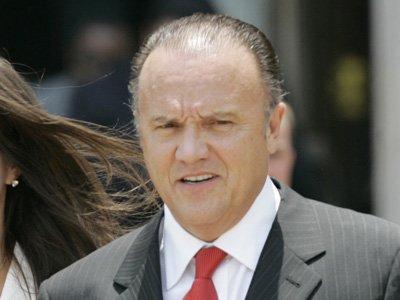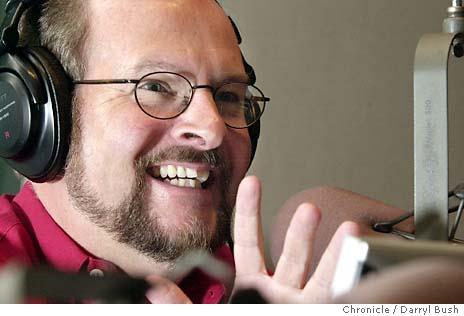
Richard Scrushy
Bribery convictions in the Don Siegelman case are based almost entirely on an aide's testimony that he saw the former governor holding a $250,000 check after a meeting with then HealthSouth CEO Richard Scrushy.That scenario, as described under oath by former Siegelman aide Nick Bailey, has a slight flaw--it never happened, according to a man who was central to the alleged transaction.
Richard Scrushy, who was released from federal prison last July after serving a six-year sentence, says he never had such a meeting with Siegelman--and he never gave the governor a check.
That is one of several major revelations from Scrushy's one-hour interview last Thursday with San Francisco-based radio host Peter B. Collins. It was Scrushy's first interview about the Siegelman case, and the podcast can be heard in its entirety here, at peterbcollins.com. Collins invited me to assist with the interview, and I was on the phone line to hear Scrushy describe the case against him and Siegelman as a "farce" and a "joke."
In fact, Scrushy still can't seem to believe that it happened. Says the former CEO:
It's painful to grow up a Boy Scout and love your country, and your daddy is in the military, and to go through all of this--and see the corruption and dishonesty. It’s hard, as an American, to experience this in our own country.
Siegelman was released from custody to pursue his appeals, but after the U.S. Supreme Court declined to hear the case, the former governor returned to federal prison last September 11. Siegelman now resides at a facility in Oakdale, Louisiana, a fact that clearly disturbs Scrushy:
He shouldn’t be in prison today. He was innocent. He did nothing wrong, I did nothing wrong. There was no corruption, no bribery. This thing is a total farce, a total fraud.
How can Scrushy make those statements with such certainty? To answer that question, we turn to the central moment in the criminal trial. It came when Nick Bailey described his boss, Governor Siegelman, holding a check for $250,000 after a meeting with Scrushy. The check, Bailey stated, was for Siegelman's education-lottery campaign, and as part of the deal, Scrushy wanted a seat on the Certificate of Need Board (CON), which regulates Alabama health-care facilities.
Those who have closely followed the Siegelman case probably can remember Bailey's version of events word for word. We referenced it in a post last June titled "SCOTUS' Refusal to Review Siegelman Case Will Forever Stand As a Reminder of Obama's Shame." Here is how we described it, with text taken directly from an appellate brief filed by government prosecutors. At the heart of the scenario is a check written by a Maryland company called Integrated Heath Services (IHS):
Siegelman and Scrushy subsequently met in Siegelman’s office. Bailey testified that, at some point after the meeting, Siegelman showed Bailey the IHS check and said that Scrushy was “halfway there. . . . ” Bailey asked, “what in the world is he [Scrushy] going to want for that?” Siegelman replied, “[T]he CON Board.” Bailey responded, “I wouldn’t think that would be a problem, would it?” Siegelman replied, “I wouldn’t think so.”
Scrushy told Collins that Bailey's version of events was wildly off track:
I never gave the governor a dime and never had a meeting with him where we discussed that I would serve on any committee or contribute to pay down any debt or help with a lottery referendum. We never had any meetings to discuss that, and they couldn’t put me in a meeting with the governor. There is no evidence to support any of that.

Peter B. Collins
Press reports repeatedly have stated that Scrushy and HealthSouth gave Siegelman $500,000 to help pay down debt from the failed education-lottery campaign. But Scrushy said the figure was $250,000, and the request never came from Siegelman. Former Alabama Power CEO Elmer Harris, who served as head of Siegelman's transition team, twice asked Scrushy for financial assistance. The first was for a contribution to the education-lottery campaign itself, and Scrushy refused to get involved. The second was to help pay down a debt once the lottery campaign had failed. Scrushy agreed to help with that, and he told Collins:They had to pay off a debt to the Democratic Party . . . , and wealthy businessmen in Alabama had signed on that note. Elmer Harris again came to see me and said Alabama Power was putting in $100,000, and ALFA Insurance was putting in a bunch, and he named a bunch of other companies that were paying it down. He said you’ve never helped the governor, and never given him a dime, you’ve never done anything in the state of Alabama to help this guy, can you help these businessmen get off this note? And I said, “OK, I will put in $250,000."
Now, I already was leaving CON. We wrote a check to help pay down that debt to the Alabama Democratic Party, which was all we ever put in. But it’s still everywhere that I gave the governor $500,000.
Scrushy still seems to have a hard time believing that he went to prison under such circumstances:
The governor and I get indicted for bribery to be on a volunteer board I didn’t want to be on. And I never gave him any money. The whole thing was a farce. We thought it was a joke, and I thought it would go away.
Scrushy proved to be wrong about that. But he is not backing away from the legal battle. Even though Scrushy has served his sentence, he has an appeal before the U.S. Eleventh Circuit, seeking discovery that might help prove misconduct on the part of judges, prosecutors, and jurors in the case.
The Collins interview marks the first time Scrushy has talked extensively about the Siegelman case. The former CEO winds up providing stunning insights into what likely is the most notorious political prosecution in American history.
(To be continued)
